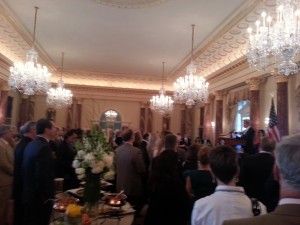May 11, 2013
Hangin’ with Secretary Kerry
Back when the Digital Public Library of America was gearing up, I oddly got invited to participate in a day of brainstorming about what could be done to make the US. State Department Diplomatic Reception Rooms more accessible to the public.
About twenty of us spent the day talking in the Rooms themselves, and we also got a tour of some of the inner offices on Secretary Clinton’s floor. I don’t know how much the day helped the State Department, but it was certainly an interesting day for me. I think my only contribution was suggesting (along with Martin Kalfatovic) that State give the DPLA its spreadsheet of objects + metadata, which I think they are getting close to doing.
The Rooms are ornate and even palatial, which strikes a discordant note for a humble democracy. On the other hand, are we supposed to pretend to visiting dignitaries that the U.S.A. can’t afford to do up a room real nice? And, most important, the rooms are filled with 5,000 museum-quality pieces of furniture, paintings, ceramics, and bric-a-brac, many with particular historic significance, such as the desk on which the Treaty of Paris was signed. You could spend days there just admiring the objects on display…if you were lucky enough to be invited to a workshop held in these rooms. Or, I suppose, if you were a visiting head of state with a surprisingly light schedule.
But what’s perhaps oddest about the Rooms is that they are stuck inside the Harry S. Truman Building, the State Department’s headquarters.

The building was designed in the 1950s, was dedicated in 1961, and from the outside looks like an upscale high school. Its large open lobby is quite pleasing, and must have been more so before all the security machinery was installed. Then the elevators open onto the 8th floor and you’re in a dream of the 18th century.
So, last night I went to a reception in the Rooms for people who had contributed to them. Very much a pinstripe and wingtip affair for the guys, and whatever is the suitable generalization for the women. There were perhaps 100 people there, and I can guarantee that every person there contributed far more to the Rooms than I had. Many had donated very substantial sums of money, for the Rooms are paid for and maintained entirely by donations; no tax payer money was harmed by these rooms. Other people have put in considerable time and effort. Not me. But I was in DC for the morning, so I had accepted the invitation.
It was a big enough occasion to rope Secretary Kerry into attending. He appeared about twenty minutes after it began, and the experienced handlers at State immediately had us form a line. As you approach Sec. Kerry, you hand a card with your name on it to an assistant; you were given this card when you went through security. You approach the Secretary as your name is read, alas, with no trumpets. The Secretary says something placeholdery to you if he doesn’t know you from Adam, puts his arm around you, and smiles for the camera. What a job.
To me the Secretary pleasantly said — having just heard my name announced — “Dr. David Douglas Weinberger. That’s a very long name.”
I’d say that that was the most insipid thing I’d ever heard, but I’m afraid I topped it. “I voted for you many times,” said I.
I was surprisingly flustered. When he put his long arm around me, I put mine around his waist, which I think violated both protocol and security procedures. I was not wrestled to the ground, and the Secretary handled it like a pro. Not me. I’m pretty sure I was staring at his collar when when the photo was taken. The man wears a beautiful collar.
Smile. Click. Next.
After the reception line, Secretary Kerry gave some quite appropriate remarks about the importance of our history despite its comparative brevity, and about the good in the world the US does, pointing specifically to the seven-fold increase in the number of kids in school in Afghanistan, and the rise from single digits to 40+% enrollment of girls. If you’re going to pick examples of US beneficence, that’s a good’un. John Kerry is smart and serious and I am happy to have him as our Secretary of State, although I’ll be happier once Ed Markey wins the election to be his replacement in the Senate.
Then it was time for massive mingling, which is never my strong suit. There was a table of excellent all-American cheeses, and a variety of all-American wines. As the bartender pointed out each wine’s state of origin, she noted that wines are made in every state. “Even Nebraska?” I asked rather randomly. “I didn’t say they were all good,” she replied, thus confirming that she is not a State Department employee and never will be.
I spent a lot of time in the comfort of Martin [twitter: UDCMRK] and Mary Kalfatovic, DPLA buddies and people I am enormously fond of. After about 30 minutes of post-Kerry mingling, we went out for Thai food.
Thus we departed the locale of what certainly should be an upcoming Nicolas Cage movie — National Treasure: Diplomatic Reception — with the Abigail Adams tiara in my pocket and no one the wiser.











